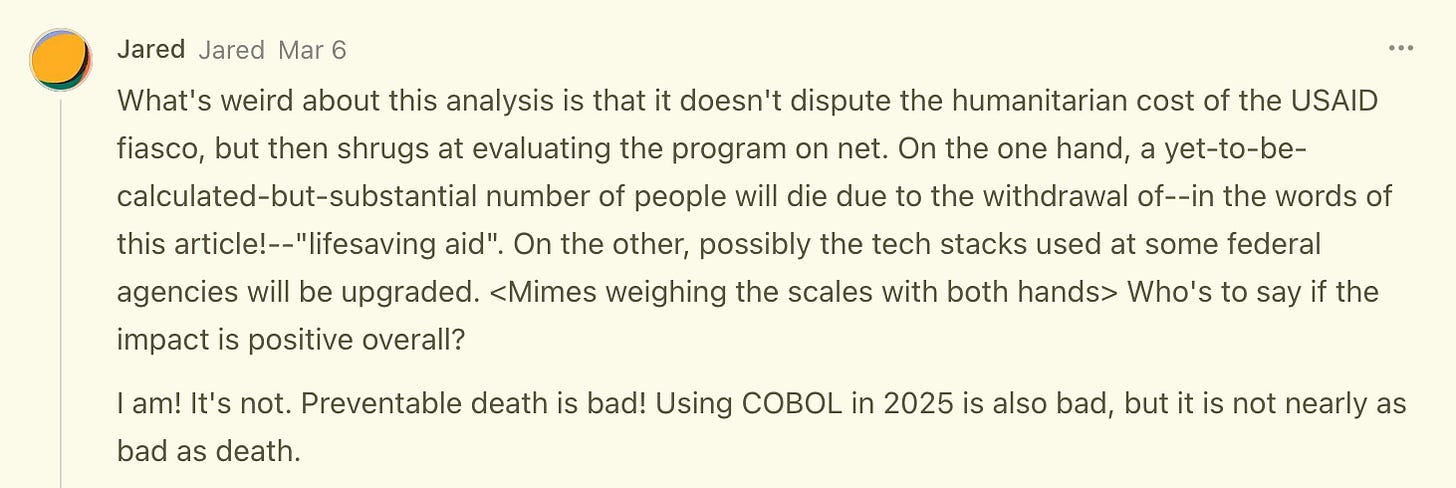Highlights from the Comments on "50 Thoughts on DOGE"
Reader responses.
The “50 Thoughts on DOGE” essay got a lot of traction over the past couple weeks. I tried to be pretty comprehensive in that essay. But a lot of readers wrote in with facets of DOGE I missed, or that they thought I didn’t properly account for. In some cases, readers thought 50 thoughts were way too many, the sign of a schizophrenic or overly generous mind.
For a printable transcript of this piece, click here:
Here are some reader reactions, bucketed by broad category:
There are legal issues with DOGE
Yes, there are open legal questions about whether DOGE’s operations are legal: for instance, whether Elon Musk taking charge of firing people at Cabinet-level agencies violates the Appointments Clause. I expect those questions to be resolved by SCOTUS. In the meantime, there’s been a lot of frustration from the White House and its allies about nationwide injunctions from district judges, and calls for the administration to ignore unfavorable rulings. But despite that frustration, all the relevant actors — President Trump, Vice President Vance, GOP Senators — have emphasized that the administration will accept judicial decisions. For more on the trend toward nationwide injunctions, see our recent conversation with Nick Bagley:
You’re way too gentle/you’re way too critical
I got it from all sides here. Some readers thought that by trying to assess DOGE on its own terms, I was giving aid and comfort to the enemies of American democracy, etc. One of the more strident responses on these lines:
There were also frustrations that I expressed a lack of certainty about what the long-term effects of DOGE would be.
People were frustrated in both directions on this front. “Where is your utilitarian calculation?”
A word on my utilitarian calculation: I am not a utilitarian. I try in the piece to call balls and strikes: things I like that DOGE is doing, things I find egregious, etc. As time goes on, I expect we will all have a clearer sense of the upshot of DOGE. But, transparently, I think the long-term effects of this sort of thing are hard to parse (especially if you think DOGE is a big deal). We live in the shadow of the New Deal; could an outside observer tell you whether the New Deal would be net positive or negative in 1935? Maybe. But it’s a hard cost-benefit to run.
DOGE is starting with the easy wins
I’ve been hearing this view a lot — and I think it has validity — DOGE is starting with the places where it’s easiest to cut, so it can rack up wins, and then will take that energy to the places that need the most cutting, like DOD. It’s certainly plausible that they’ve picked easier targets to start with — I can’t find the quote from Statecraft interviewee Russ Vought, but he’s argued that in order to cut welfare, you need to win over the American people by slashing other wasteful expenditure first, the stuff that’s less close to home.












This is nonsense. The administration is already ignoring judicial orders in multiple areas. Who cares what they’ve “emphasized,” they are transparently a pack of liars. You are not calling balls and strikes, this is very obviously an enormous illegal power grab. The comparison with the New Deal is facile, and a Heritage talking point—everything FDR did, *including trying to expand the Court*, he did through laws passed in Congress. That is entirely different from simply trying to personalize the power of the entire executive branch, which is very clearly what is happening.
Do you really think that personalization has a great track record for improving state capacity or the ability of governments to make credible commitments? Is there anything in what is occurring that truly leads you to think either of those things could be improved by the actions being taken specifically?
Yes the vagaries of fate mean that “in the long term” almost anything is possible, but should that really stop you from drawing the obvious conclusion about what is plainly happening in front of our faces? This is all de-institutionalization, a hallmark of personalization, and manifestly NOT something that leads to high state capacity and a beneficial environment for STEM innovations.
Just because some guy says the President is more powerful than a king doesn’t mean I have to take it seriously as a legal theory. Maybe SCOTUS will rectify it later, but right now the operating philosophy of the executive branch is so untethered that the Constitution is no longer in effect.